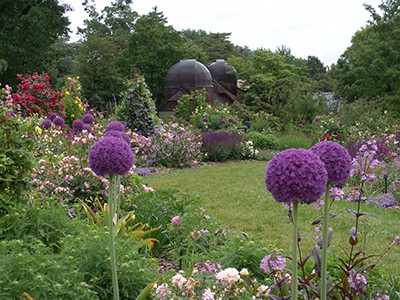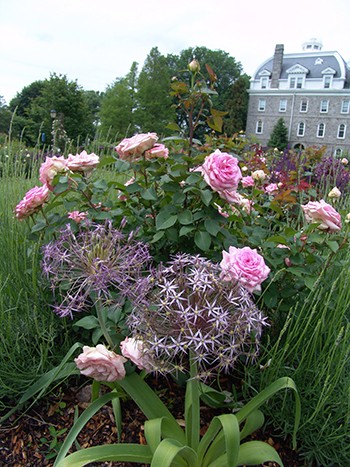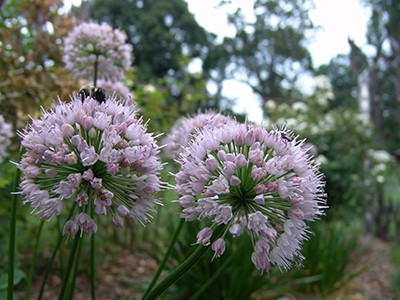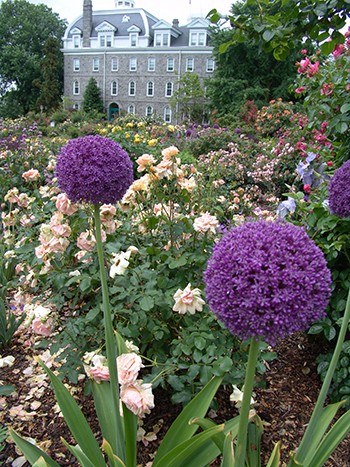Gardening Best Friends: Allium and Roses
 Is your garden plagued by aphids, slugs, cabbage worms, or other pests? If so, Allium may be the solution you have been waiting for. The ornamental onion genus, Allium¸ which includes chives, garlic, leeks, and shallots is regarded as a broad spectrum natural insect repellent. Thus Allium is planted as a beautiful, dramatic bedfellow of roses throughout the newly renovated sustainable Dean Bond Rose Garden.
Is your garden plagued by aphids, slugs, cabbage worms, or other pests? If so, Allium may be the solution you have been waiting for. The ornamental onion genus, Allium¸ which includes chives, garlic, leeks, and shallots is regarded as a broad spectrum natural insect repellent. Thus Allium is planted as a beautiful, dramatic bedfellow of roses throughout the newly renovated sustainable Dean Bond Rose Garden.

The low profile of Allium christophii combines well with roses in the Dean Bond Rose Garden. photo credit: R. Robert
Many unwelcomed pests are attracted by odors emitted from plants. Members of the allium family, Amaryllidaceae, emit a sulfur/onion odor that masks the smell of other plants, but is undetectable to humans, so alliums serve as a good repellent to aphids, a common pest of roses.

Allium angulosum ‘Summer Beauty’ blooms during the heat of the summer, July to August. photo credit: R. Robert
The benefits of our “stinky friends” also extend below the soil. They keep subterranean pests such as grubs and nematodes at bay. Grubs grow into Japanese beetles which burrow into rose buds to eat the developing flowers. Another reason roses and alliums should be garden best friends.

Allium ‘Gladiator’ attracts all types of pollinators and beneficial insects. photo credit: R. Robert
In addition to the natural repellent mechanism, alliums are beautiful in the landscape. The long-blooming flowers range from large to enormous purple ball-like blooms making a striking presence in the landscape. The flower heads also dry nicely creating multiple-season interest.
Along with beauty, Allium offers the full package. It attracts beneficial insects such as hoverflies, bees, and parasitic mini wasps. For example, parasitic mini wasps feed on the pollen of Allium and other small flowers. The larvae of the wasps feed inside beetle grubs and aphids, killing many unwanted pests.

The purple of Allium ‘Gladiator’ compliments the many colors blooming in the Dean Bond Rose Garden. photo credit: R. Robert
The ornamental onion is available in a variety of sizes and bloom times. This beauty and function has made it a staple in our efforts to create a sustainable rose garden. Add it to your garden mix and you will not be disappointed.





Joan Ruzzo
Posted at 12:31h, 17 MayI have a beautiful crop of three feet alliums planted next to a older, but not quite thriving Alberta Spruce. I cannot even walk past the tree for the flies that have been there nonstop for two days. It’s like being in a garbage dump and inconvenient because it is the main pathway to the front door. I am considering how fortunate I am that they are covering the tree and not in my home. Are these useful flies, hoverflies, that will leave after a short period of time or is it time to start spraying, trapping. I have a jar of vinegar and sugar with a paper funnel and has now set a adhesive flytrap barrel next to the tree. The bees and wasps are staying on top of the allium and are not a problem.
Rosebushes, clematis,, sweet alysumm and garlic are also planted in the same area.
Mary Tipping
Posted at 08:13h, 18 MayHi Joan,
Are you certain that the insects around your Allium are hoverflies?
Mary Tipping
Scott Arboretum